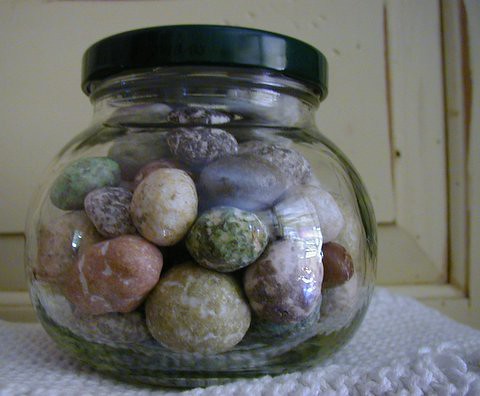"Fear is good. Like self-doubt, fear is an indicator. Fear tells us what we have to do. The more scared we are of a work or calling, the more sure we can be that we have to do it, and the more important it is to the growth of our soul.
If you didn't love the project that is terrifying you, you wouldn't feel anything. The opposite of love isn't hate; it's indifference."
-Steven Pressfield, The War of Art: Break Through the Blocks and Win Your Inner Creative Battles
From time to time I post notes on this blog from special books that I believe will really help people think about their lives in a new or different way.
I heard about The War of Art while reading Chris Guillebeau's E-Book, 279 Days to Overnight Success. I saw the title and subtitle and without reading a single review or even the book description, I bought it. I was that desperate.
I hadn't worked on my book in months, and it was eating away at me. As Pressfield describes it, "A low-grade misery pervades everything." I thought I needed to figure myself out before continuing to write. After reading this book, I realized that while self-reflection is helpful, there are times that it is just plain procrastination wrapped up in a pretty bow. Or in my case, a complicated one.
What I loved about this book was the way it helped me frame my resistance, a sneaky form of inner critic that can seem very helpful at times. While this book is focused on writing, it applies to a much broader spectrum of efforts and touches upon procrastination, self-doubt, professionalism and fears that arise as we strive to fulfill our true purpose.
I believe we are all meant to be creative (check-out The Artist's Way for the definitive book on this topic). To be creative is to be human, to be fulfilled. Pressfield helps break-down some of the common obstacles to creativity - he helps you get out of your own way.
Just like my last round of book notes, I preface this with a GET READY FOR A LONG POST! disclaimer. This book may not speak to everyone the way it spoke to me - but I hope that those who do read the full notes will come away with something truly valuable. Want to share books? Add me on Good Reads.
The War of Art: Break Through the Blocks and Win Your Inner Creative Battles
Steven Pressfield
Book One: Resistance - Defining the Enemy
There's a secret that real writers know that wannabe writers don't, and the secret is this: it's not the writing part that's hard. What's hard is sitting down to write. What keeps us from sitting down is Resistance.
To yield to Resistance deforms our spirit. It stunts us and makes us less than we are and were born to be.
Does Resistance have to cripple and disfigure our lives before we wake up to its existence?
Any act that rejects immediate gratification in favor of long-term growth, health, or integrity will elicit Resistance.
Resistance is Invisible: We experience it as an energy field radiating from a work-in-potential. It's a repelling force. It's negative. Its aim is to shove us away, distract us, prevent us from doing our work.
Resistance will tell you anything to keep you from doing your work. It will perjure, fabricate, falsify; seduce, bully, cajole.
Rule of thumb: The more important a call or action is to our soul's evolution, the more Resistance we will feel toward pursuing it.
Resistance is fueled by fear: We feed it with power by our fear of it.
Resistance obstructs movement only from a lower sphere to a higher. It kicks in when we seek to pursue a calling in the arts, launch an innovative enterprise, or evolve to a higher station morally, ethically, or spiritually.
The danger is greatest when the finish line is in sight. At this point, Resistance knows we're about to beat it. It hits the panic button.
Resistance by definition is self-sabotage.
Procrastination is the most common manifestation of Resistance because it's the easiest to rationalize. We don't tell ourselves, "I'm never going to write my symphony." Instead we say, "I am going to write my symphony; I'm just going to start tomorrow."
The most pernicious aspect of procrastination is that it can become a habit.
Casting yourself as a victim is the antithesis of doing your work. Don't do it. If you're doing it, stop.
What does Resistance feel like? Unhappiness. We feel like hell. A low-grade misery pervades everything. We're bored, we're restless. We can't get no satisfaction. There's guilt but we can't put our finger on the source. We want to go back to bed; we want to get up and party. We feel unloved and lovable. We're disgusted. We hate our lives. We hate ourselves.
Self-doubt can be an ally. This is because it serves as an indicator of aspiration. It reflects love, love of something we dream of doing, and desire, desire to do it.
Fear is good. Like self-doubt, fear is an indicator. Fear tells us what we have to do. Remember our rule of thumb: the more scared we are of a work or calling, the more sure we can be that we have to do it, and the more important it is to the growth of our soul.
If you didn't love the project that is terrifying you, you wouldn't feel anything. The opposite of love isn't hate; it's indifference.
Here's the trick: We're never alone. As soon as we step outside the campfire glow, our Muse lights on our shoulder like a butterfly. The act of courage calls forth infallibly that deeper part of ourselves that supports and sustains us.
There is a concept that one needs to complete his healing before he is ready to do his work. This way of thinking is a form of Resistance. What are we trying to heal, anyway? The athlete knows the day will never come when he wakes up pain-free. He has to play hurt.
The part we create from can't be touched by anything our parents did, or society did. In fact, the more troubles we've got, the better and richer that part becomes.
Don't get me wrong. I've got nothing against true healing. We all need it. But it has nothing to do with doing our work and it can be a colossal exercise in Resistance. Resistance loves "healing." It knows that the more psychic energy we expend on dredging and re-dredging the tired, boring injustices of our personal lives, the less juice we have to do our work.
It's one thing to lie to ourselves. It's another thing to believe it.
Rationalization is Resistance's spin doctor. What's particularly insidious about the rationalizations that Resistance presents to us is that a lot of them are true. They're legitimate. What Resistance leaves out, of course, is that all that means diddly.
Book Two: Combating Resistance
Someone once asked Somerset Maugham if he wrote on a schedule or only when struck by inspiration. "I write only when inspiration strikes," he replied. "Fortunately it strikes every morning at nine o'clock sharp." That's a pro.
All of us are pros in one area: our jobs. Now: Are there principles we can take from what we're already successfully doing in our workaday life and apply to our artistic aspirations? What exactly are the qualities that define us as professionals?
We show up every day.
We show up no matter what.
We stay on the job all day.
We are committed over the long haul.
The stakes for us are high and real.
We accept remuneration for our labor.
We do not over-identify with our jobs.
Resistance knows that an amateur composer will never write his symphony because he is overly invested in his success and over-terrified of its failure. The amateur takes it so seriously it paralyzes him.
The more you love your art/calling/enterprise, the more important its accomplishment is to the evolution of your soul, the more you will fear it and the more Resistance you will experience facing it.
A professional is patient: Resistance outwits the amateur with the oldest trick in the book: It uses his own enthusiasm against him. Resistance gets us to plunge into a project with an overambitious and unrealistic timetable for its completion. It knows we can't sustain that level of intensity. We will hit the wall. We will crash.
The professional arms himself with patience, not only to give the stars time to align in his career, but to keep himself from flaming out in each individual work.
The professional will not tolerate disorder. He eliminates chaos from his world in order to banish it from his mind.
The amateur believes he must first overcome his fear; then he can do his work. The professional knows that fear can never be overcome. He knows that once he gets out into the action, his fear will recede and he'll be okay.
A professional accepts no excuses: He knows if he caves in today, no matter how plausible the pretext, he'll be twice as likely to cave in tomorrow.
A professional is prepared at a deeper level. He is prepared, each day, to confront his own self-sabotage.
The professional keeps his eye on the doughnut and not on the hole.
A professional self-validates: An amateur lets the negative opinion of others unman him. He takes external criticism to heart, allowing it to trump his own belief in himself and his work. Resistance loves this.
The professional learns to recognize envy-driven criticism and to take it for what it is: the supreme compliment. The critic hates most that which he would have done himself if he had the guts.
I like the idea of being Myself, Inc. That way I can wear two hats. I can hire myself and fire myself. It reinforces the idea of professionalism because it separates the artist-doing-the-work from the will-and-consciousness-running-the-show.
There's no mystery to turning pro. It's a decision brought about by an act of will. We make up our mind to view ourselves as pros and we do it. Simple as that.
Book Three: Beyond Resistance - Higher Realm
The most important thing about art is to work. Nothing else matters except sitting down every day and trying. When we sit down and work, we become like a magnetized rod that attracts iron filings. Ideas come. Insights accrete.
The Mother of all Fears is so close to us that even when we verbalize it we don't believe it. Fear That We Will Succeed. That we can access the powers we secretly know we possess. We know that if we embrace our ideals, we must prove worthy of them. And that scares the hell out of us.
Yeah, we lose friends. But we find friends too, in places we never thought to look. And they're better friends, truer friends. And we're better and truer to them.
We can't be anything we want to be. We come into this world with a specific, personal destiny. We have a job to do, a calling to enact, a self to become. Our job in this lifetime is not to shape ourselves into some ideal we imagine we ought to be, but to find out who we already are and become it.
Creative work is not a selfish act or a bid for attention on the part of the actor. It's a gift to the world and every being in it. Don't cheat us of your contribution. Give us what you've got.
 I may be stating the obvious on this one. The painfully obvious. But it's so important to me that I feel compelled to make sure you are in the loop too.
I may be stating the obvious on this one. The painfully obvious. But it's so important to me that I feel compelled to make sure you are in the loop too.

 I am so ridiculously, incredibly, unbelievably proud of you.
Your optimism, spirit and drive are amazing.
Your attitude toward life is inspiring.
You had an idea and you went for it.
You did not let a single fear hold you back.
You built relationships with people who want to help you.
You make people laugh. All the time.
The qualities that make you great at football - strength, speed, discipline, instinct and the ability to quickly process information - will serve you very well in business.
You are smart as a whip.
You make me proud to be a Blake.
I am so ridiculously, incredibly, unbelievably proud of you.
Your optimism, spirit and drive are amazing.
Your attitude toward life is inspiring.
You had an idea and you went for it.
You did not let a single fear hold you back.
You built relationships with people who want to help you.
You make people laugh. All the time.
The qualities that make you great at football - strength, speed, discipline, instinct and the ability to quickly process information - will serve you very well in business.
You are smart as a whip.
You make me proud to be a Blake. 




